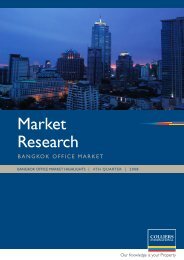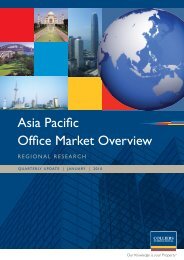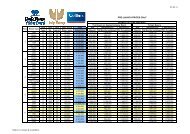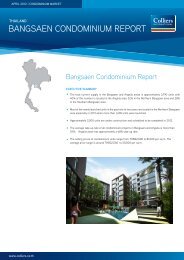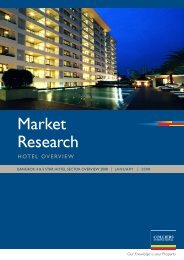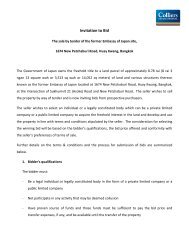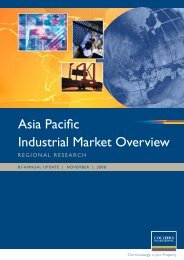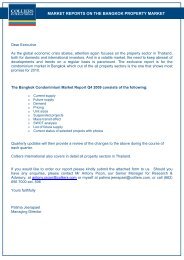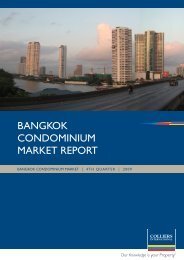CUBIC CoverDec08.indd - Colliers
CUBIC CoverDec08.indd - Colliers
CUBIC CoverDec08.indd - Colliers
You also want an ePaper? Increase the reach of your titles
YUMPU automatically turns print PDFs into web optimized ePapers that Google loves.
DESTINATIONS<br />
callosum, a stunning purple and white flower<br />
that is listed as an endangered species.<br />
WAR’s plant surveys have also recorded two<br />
more orchid species never seen before on the<br />
Vietnam mainland – the Malaxis calophylla and<br />
Aphyllorchis montana, two rare orchids that<br />
bloom in tiny and delicate blossoms.<br />
“These discoveries have been absolutely<br />
extraordinary; nobody knew that we would<br />
find such species (on the island),” said Scriven.<br />
According to Khoi, “Additional surveys of<br />
insects, reptiles and fish are also proving<br />
‘fruitful’.” They are uncovering more new<br />
species on the island such as dragonflies, the<br />
snake-like Banna Caecilian and the Olive Tree<br />
Skink.<br />
FINDING A BALANCE<br />
Environmental work aside, WAR has also been<br />
bridging the gap between preserving natural<br />
resources and economic development. Scriven<br />
noted that, while the idea of sustainable<br />
development is recognised as being a good<br />
thing, “there are different understandings<br />
of what sustainable development actually is;<br />
the issues are different across countries and<br />
cultures”.<br />
“In Phu Quoc, we had to find a means of<br />
livelihood that is suitable for the local people<br />
and sustainable for the environment.” Other<br />
creative ways to provide sustainable livelihoods<br />
have been to farm butterflies and breed rare<br />
plants, said Scriven. One WAR project is to<br />
rehabilitate a locally endangered broad-leafed<br />
plant species known as Dau Long, or the<br />
Dipterocarpus intricatus.<br />
Another has been to support farmers in<br />
the transition from fishing to the sustainable<br />
cultivation of mud and swimmer crabs. It’s not<br />
an easy task, said Scriven, but one that is worth<br />
trying as it provides gainful employment and<br />
sublimates activities away from environmentally<br />
harmful occupations such as overfishing, which<br />
is already wreaking havoc on marine populations<br />
in Phu Quoc and many parts of Vietnam.<br />
In a way, Scriven’s commitment to managing<br />
a balance of long-term economic growth with<br />
responsible activity is not something new to<br />
him. His investment firm, Dragon Capital –<br />
which manages around USD2 billion of funds<br />
in Vietnam – is one of the leaders in socially<br />
responsible investing (SRI), making decisions on<br />
investment based not only on returns but also its<br />
social good.<br />
SRI is a booming market in both the US<br />
and Europe. According to the Report on<br />
Socially Responsible Investing Trends, assets in<br />
such portfolios climbed to USD2.71 trillion in<br />
2007, up from USD2.16 trillion in 2003 in the<br />
United States. Research estimates by financial<br />
consultancy Celent predict that the SRI market in<br />
the US will reach USD3 trillion by 2011.<br />
Ethical investment in Europe has also<br />
reached significant amounts, with the SRI<br />
market growing from USD1 trillion in 2005<br />
to USD1.6 trillion in 2007. According to the<br />
Ethical Investment Research Service (EIRIS), £9.8<br />
billion is invested in ethical and environmental<br />
investment funds in the United Kingdom alone.<br />
But Scriven noted that the assets class of SRI<br />
has still not yet proved itself commercially. “One<br />
of the reasons is that the cost of development<br />
and pollution is not properly priced,” he said.<br />
Nevertheless, “there are people in the world<br />
who will invest not necessarily because of<br />
investment merit but because of their personal<br />
commitment. They wish to be responsible.<br />
Dragon Capital is one of those companies that<br />
are trying to learn to be responsible.”<br />
It’s a movement that’s taking off as global<br />
citizens seek to address and make an impact<br />
– albeit indirectly – on social issues, such as<br />
environmental concerns, consumer protection,<br />
human rights and social equality. Just like his<br />
reasons for giving back to Vietnam and its<br />
wildlife, ethical investing is an issue of playing a<br />
responsible role in the society in which one lives.<br />
“Business and success are increasingly judged<br />
not just by economic and financial means, but<br />
by their corporate responsibility,” said Scriven.<br />
In Phu Quoc, the work may be painstaking<br />
and the road ahead long, but WAR is still<br />
dedicated to preserving its natural heritage<br />
for the future of Vietnam. It’s also a labour of<br />
love. Scriven sums it up poetically, “It’s a place<br />
that speaks to my spirit. From there comes the<br />
willingness to commit to the island.”<br />
Dominic Scriven, Director of Dragon Capital<br />
| January 2009 53



